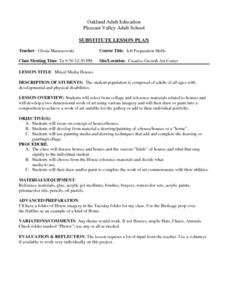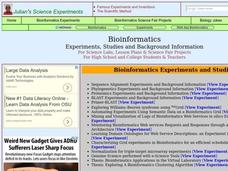Curated OER
DO YOU HEAR WHAT I SEE?
Students work with a partner to describe an image, and the other, without seeing the image, attempts to draw it. They sit back to back. Students are explained that until the exercise is complete, they must remain with their backs to each...
Curated OER
Protecting Your Identity--and Helping Other Protect Theirs
Students create a presentation explaining how they can guard against identity theft. Prior to creating the presentation, students research identity theft: how it occurs, how to avoid it, what to do when someone thinks it has happened to...
Curated OER
Lesson Plans for Portrait of the Young Countess Schouvalof
Students analyze the art for the Young Countess of Schouvalof and also practice recognizing the work of Le Brun, Leonardo da Vinci, and Andy Warhol. In this portrait art lesson plan, students analyze copies of the artists work and mark...
Curated OER
Mixed Media Houses
Students select from collage and reference materials related to houses and develop a two dimensional work of art using various imagery and then draw or paint into a composition to achieve a work of art suitable for the gallery or add to...
Curated OER
Relief Tile Making
This lesson is intended for adult students with mental and physical disabilities. Students watch as the teacher demonstrates cutting out tile using a wood template. The students receive two tiles that are the same size. They draw a...
Curated OER
Drawing of Animal of Student's Choice
Adult students with developmental disabilities are the focus of this instructional activity. Students look through a variety of printed material to locate an animal to draw. They draw an animal with a background with either black pen or...
Curated OER
Painting Modern Life
Examine three Cubism art pieces by Pablo Picasso and Georges Braque with your students. They will research how Cubism was advanced due to Picasso and Braque. and then compare and contrast Cubist works through image based discussion. Your...
Curated OER
This Was the Noblest Roman of Them All
High schoolers analyze the problems with staging and character using the play Julius Caesar. They summarize the final scene of the play and view film versions of the scene. Additionally, they prepare a promptbook for the final scene and...
Curated OER
Fashion Recycles
Complete fashion design activities as a part of a study on protecting the environment. In this fashion and environment lesson, students discuss global environmental awareness and work in groups to list recyclable products that can be...
Curated OER
Quilting Geometry
Study geometry through the concept of quilt design. High schoolers examine the geometric shapes in various quilts and then create their own quilts using geometric shapes that fit together. In the end, they write a paragraph to describe...
Curated OER
English/Language Arts Methods Project
Students design a webquest requiring higher order thinking and providing students with opportunities to reflect on their learning. They include an assessment tool to evaluate the process and product.
Curated OER
Poetry and Hip Hop
High schoolers compare and contrast the genres of poetry and hip-hop. They view a poetry slam and write about it in their journals. Learners view a Lauryn Hill music video and respond to it in their journals. They compare and contrast...
Curated OER
Cell Game
Make a prototype of a game based on cell biology. Researching game design and working in groups to create a game will activate knowledge of cell biology. The review task will help students learning as they test out the games and their...
Curated OER
The Role of Amyloid in Alzheimer's Disease
Students explore amyloid proteins through a series of experiments. In this biology lesson, students explain the causes of Alzheimer's disease. They identify common symptoms related to this condition.
Curated OER
Bioinformatics
Young scholars conduct a series of scientific investigation using bioinformatics. In this molecular biology lesson, students collect experimental data using different educational softwares. They calculate and analyze relationships using...
Curated OER
Proteomics
Students analyze data taken from proteomic experiments. In this biology lesson, students explain the importance of bioinformatics tools in the study of proteins. They evaluate scientific results using math and computer software.
Curated OER
Art and the Berlin Wall
Students study the relationship between Cold War politics, the people who were affected by it, and the artists who examined it. They create their own "walls" using a spray paint graffiti procedure.
Curated OER
Determining Beam Stress and Deflection with COSMOSXpress
Students analyze cantilever stress using COSMOSXpress. In this engineering lesson, students calculate the beam's maximum deflection. They investigate the effect changing beam dimensions.
Curated OER
Autism – What Is It?
Students create a poster about expected development versus observed behavior of a child with autism. In this health lesson, students describe the signs of ASD. They read and analyze a simulated case study.
Curated OER
Modeling a Centrifugal Compressor Wheel
Young scholars create a model of centrifugal compressor wheel following step-by-step instructions. In this technology lesson, students use SolidWorks to create curved surfaces. They give practical applications of a centrifugal compressor.
Curated OER
The Power of PV: Measuring the Power and Energy of Photovoltaic System
Students explore photovoltaic systems. In this alternative energy lesson, students calculate solar panel efficiency and convert devices to solar energy using photovoltaic cells.
Curated OER
Fishing
Learners explore the techniques and basic needs of the fisherman. In this fishing lesson, students view a demonstration of the use of fishing equipment. Learners research Iowa farm ponds and design a class mural from their information. ...
Curated OER
Conditions at Sea Data Activity
Students study how to forecast sea conditions. In this oceanography lesson students complete a class activity on wave making.
Curated OER
Introducing the Memo
Students explore memos to gather important information. In this memos lesson, students interpret memos and answer questions based on the information. Students define the parts of a memo. Students create their own memos.

























